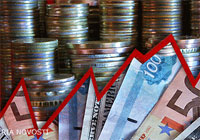CONFERENCE CALL: Muted mood at Kremlin’s St Petersburg forum

(Business New Europe – bne.eu – Ben Aris in St. Petersburg – May 23, 2014) The mood is muted at the Kremlin’s annual St Petersburg International Economic Forum, which runs May 22-24. The threat of international sanctions is hovering over the heads of Russia n and foreign delegates in attendance at Russia’s premiere investment forum, and the impact of these sanctions has invaded the discussion at many of the sessions.
Scores of international investors chose to stay away after Washington put pressure on American CEOs in particular not to attend. However, equally noticeable are the international businessman that chose to defy their governments in favour of the strong business relationships they have built with Russia. Just showing up has been turned into a political statement for men and women that normally shy away from politics.
Lord Mandelson is a politician and so for him the choice was even more acute, as his actions were closely watched by the British press. A fan of Russia, he has been visiting the country in both a public and private capacity in recent years. Mandelson decided to attend and was outspoken on many of the panels in which he participated.
“I did consider not participating. It would’ve b een a political statement: stay away or come and engage with Russia through debate. I am in a political no-man’s land at the moment (hopefully temporarily), but decided that it is better to engage than to abstain. Until recently, Russia was a “must go” place [for business]. What has been surprising is the speed that political risk can rise and that sentiment can fall.”
Mandelson went on to say that one of the problems with the current crisis is that Russia has become more unpredictable and that undermines the trust that business people have built up in the country. “The view of Russia has changed and this could hang over the country for a very long time. The danger is that the negative sentiment hardens like cement and then is very difficult to change in the future,” he said.
The muted mood is shared by Russia’s investment vetrans. Bernie Sucher has founded half a dozen businesses over the last two decades and was the CEO of both Alfa Capital, a leading domestic investment bank, as well as of Morgan Stanley’s Moscow office.
“In the 90s we were working to form order out of the chaos. But there was a broad agreement amongst everybody that with its resources and influence Russia would eventually become part of Europe and enjoy more-or-less normal relations with the USA,” said Sucher.
“The concentration of power has grown in recent years and the current events guarantee that these folks will concentrate even more power. They are not going anywhere. If you believe that Russia was a competitive and innovative society that embraced the new, then on March 1 when they annexed Crimea those ideas were flushed down the toilet. Russia won’t return to a normal paradigm anytime soon. There is a long, hard and lonely road ahead,” said Sucher, who adds that this doesn’t necessarily mean economic stagnation, just a much slower pace of reforms.
“This crisis has little to do with Ukraine or even if the Russian troops are on the eastern or western side of its Ukrainian border. It’s all about what Russia is doing to itself,” said Sucher. “Don’t focus on the details of the sanctions. The most powerful impact comes from their impact on market sentiment. Before companies were debating the level of risk and how to obey the rules. In this environment it’s not about obeying the rules but being seen to obey the rules. Companies that are thinking like that won’t be successful.”
German companies are particularly visible in St Petersburg and have reiterated their commitment to Russia. But Sucher points out they will be committed as long as they make profits. If the economy continues to slow, then their pragmatism will evaporate.
Certainly the topics being discussed in the sessions at the forum are all the right ones – restructuring, reform, infrastructure, modern technology and efficiency. But the issue with Russia has never been the ideas; it has always been the implementation. The recent events do not bode well. The leadership has been more focused on geopolitics then the nuts and bolts of building a new and efficient Russia.
The jury is now out on Russia’s future. There is a clear division in opinion amongst the delegates in St Petersburg. There are those who fear Russia has just taken a massive wrong turn that will lead to stagnation and ossification of the political process. There are others who believe that the wealth of the country and the intelligence of the people mean Russia will eventually surmount its problems.
